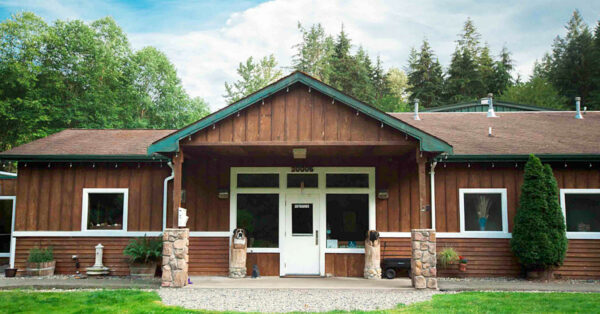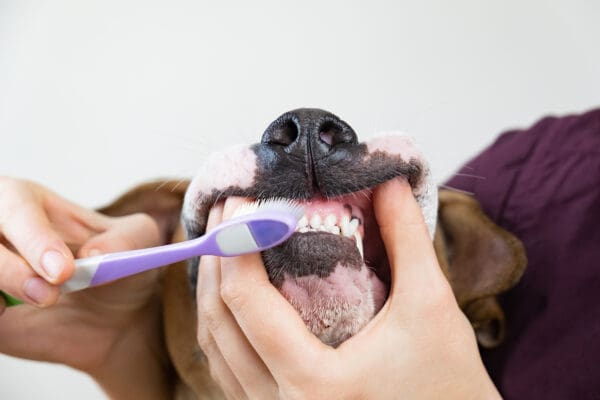Avian Nutrition

Birds are naturally long-lived animals, and a healthy diet and proper care is essential to their well-being. Birds fed nutritionally deficient diets have a greater incidence of disease and a significant reduction in lifespan. Providing your bird with a nutritionally balanced diet will help him/her live longer, stay healthier, and have a better quality of life.
Feeding Your Bird
Ideally, your pet bird’s diet should closely mimic the food items his/her species would eat in the wild. Depending on the individual species of bird, this could include grains, seeds, nuts, vegetables, fruits, leaves, flowers, insects, and many other items that are specific to their native environment. Many of these foods are only seasonally available, and may be difficult or impossible to purchase commercially.
Nutritionally balanced pelleted diets have been developed in an attempt to help bird owners offer their companions a healthy diet. These pellets are created using a blend of grains, seeds, vegetables, fruits, vitamins, minerals, and other essential nutrients. The pelleted diet recipes are formulated based on the latest research in avian nutrition. Pelleted diets are an excellent dietary staple and provide balanced nutrition with each bite. However, it is inappropriate to assume that every pellet contains every nutrient that every species of bird needs over the course of its lifetime.
Most species of companion birds should receive a diet comprised of 50-80% formulated pelleted food. The remainder of the diet should include fresh or frozen vegetables, fresh or frozen fruits, and a small amount (<10% of the total diet) of healthy table foods, seeds, and nuts. There are exceptions to this rule depending on the individual bird species (lories, softbills, certain macaw species, etc.), so be sure to thoroughly research your pet’s nutritional requirements, and feel free to ask us for specific dietary recommendations.
Formulated Diets
Many brands of formulated food are available. Examples of companies that have a proven track record of providing quality, balanced diets include: Zupreem, Roudybush, Lafeber pellets, and Harrisons.
Some birds dislike particular brands of pellets, so be sure to shop around and offer a variety to your bird until you find one that he/she likes. Please review the label to make sure you are purchasing an appropriately sized pellet for your bird.
Produce and Table Food
Most produce and table foods that are healthy for people are also nutritious for birds. Either fresh or frozen produce can be fed, but canned foods should be avoided, as safety of certain preservatives has not been determined for many bird species. All fresh fruits and vegetables should be thoroughly washed before feeding. Do not leave fresh foods in the cage for more than 2 hours to prevent spoiling. Examples of some of the more beneficial foods are listed below, but please note that this is NOT an all-inclusive list.
Healthy Vegetables (can be fed cooked or raw – should comprise < 20% of the diet for most species)
- Broccoli
- Cucumber
- Carrots
- Green Beans
- Spinach
- Sweet potatoes
- Peppers (sweet, bell, hot)
- Squash
- Dark leafy greens
Healthy Fruits (should comprise <10% of the diet for most species)
- Apple
- Papaya
- Mango
- Melons (cantaloupe, honeydew, watermelon, etc.)
- Berries (strawberries, blueberries, blackberries, raspberries, etc.)
- Bananas
- Oranges
- Kiwi
- Peach
- Pineapple
- Pomegranate
Fruits should be fed in limited amounts, as they are very high in sugar, and can predispose to obesity.
Healthy protein sources (should comprise < 5% of the diet for most species)
- Cooked (not fried) low fat chicken
- Cooked fish (excellent source of omega fatty acids)
- Tree nuts (not peanuts)
- Cooked beans; raw beans contain toxins that are inactivated by cooking (except green beans)
Healthy table food (should comprise <5% of the diet for most species)
- Pasta (cooked or dried, no sauce)
- Oatmeal
- Quinoa
- Rice
- Small amounts of cereal grains and bread
Seed (should comprise <20% of the diet for most species)
Seed is a favorite food of many birds. However, seed is high in fat, and low in over 20 vital nutrients. Although manufacturers often label seed diets as “fortified with vitamins and minerals,” this is equivalent to dusting a candy bar wrapper with vitamins before eating the candy bar. Birds remove the hull from seeds before eating them (just like we remove candy bar wrappers before eating candy bars). Unless the seeds in the diet were hulled by the manufacturer prior to sprinkling them with nutrients, your bird will ingest almost none of the added supplements. Birds fed seed diets also tend to pick out their favorite types of seeds from the diet, and refuse to eat the other seeds. This can result in many nutritional deficiencies.
For these reasons, we generally do not recommend feeding seed mixes as a dietary staple. Larger birds’ diets should typically only contain 10-15% seeds. Smaller birds, such as budgerigars, cockatiels, and parrotlets, have a higher requirement for seeds than larger birds. We recommend that smaller birds receive 20-30% of their diet as a high quality seed mix.
Some healthier seed treat options include Lafeber’s Nutriberries and Avi-cakes; they are typically very palatable, and contain a small percentage of pellets mixed in with the seeds. These products may also help transition birds eating a primarily seed diet into eating a healthier pelleted diet. Moving from a seed mix to nutriberries or avicakes may take a little time. Some birds may not eat them the first time they see them. Try crushing them up into the current diet to start with. Gradually crush them less and less until your bird is eating them whole.
Seed may also be used as treats for training healthy birds.
Do not make any sudden changes in the diet or some birds can actually starve themselves. See our handout on diet conversion for more details.
Supplements
Birds consuming pelleted foods as greater than 50% of their total diet do not require any additional supplementation with vitamins and minerals. Further supplementation of vital nutrients can be toxic. Many supplements contain very high levels of lipid-soluble vitamins, which store in the body and can easily reach dangerous levels. Please consult with your veterinarian before administering any additional dietary supplements.
Water based supplements may impact interest in drinking and are not recommended
“Digestive aids”, such as grit, gravel, cuttlebone, and mineral blocks, are unnecessary for most companion bird species, including parrots. Pigeons and fowl receiving non-pelleted diets do require some grit supplementation for normal digestion.
Foods to Avoid
The following food items contain toxins that can be fatal if fed in sufficient amounts:
- Avocado
- Chocolate
- Alcohol
- Caffeine
- Uncooked dry beans and legumes
Other foods to avoid include:
- Foods high in salt and preservatives, including salty snacks such as chips, crackers, pretzels and preserved meats.
- Peanuts are prone to containing aflatoxins (from a fungus that is often present in their shells), which can lead to organ failure. Exposure to very low levels of aflatoxins can be fatal to birds.
- Dairy products, including milk, yogurt, and cheese. Most birds do not have the enzymes to break down milk proteins effectively, and feeding these foods may lead digestive problems.
March 30, 2015
Content of this Care Sheet Courtesy of:
The Center for Bird and Exotic Animal Medicine
11401 NE 195th St. Bothell, WA 98011
(425) 486-9000 PHONE (425) 486-9002 fax



